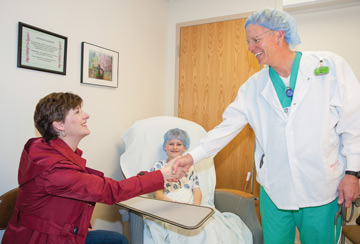“Evidence-based studies show that patients who trust their providers have better outcomes,” says Ms. Engle. “We find it’s probably more important that patients trust their nursing staff because we’re with them longer
than surgeons are. The more we connect with them as a person, the better their experiences and the higher their opinion of the care they receive.”
Ask patients if it’s OK to address them by their first names, which helps to build a more personal connection and ensures they don’t feel like just another case you have to move through the facility. It’s impossible to avoid
standing directly over prone patients, but doing so can be an intimidating presence from the patient’s point of view. Whenever possible, stoop down to their level to talk with them, hold their hands and make direct eye contact. Also
pause, and refocus on the patient in front of you in the moment.
“Every nurse who comes in contact with our patients makes an effort to know them, beyond their chart,” says Ms. Engle. “We sit at the bedside and talk about their life outside the facility. We’ve discovered so many amazing
things about our patients, and we have bonded with them on a different level.”
When talking with patients, ask them about seemingly little things about their personal lives — family members, recent travels and pets are popular conversation starters. You’d be surprised by how much they’ll be willing to share
and how appreciative they are of your interest. “Just asking about the basics,” says Ms. Engle. “If you have a conversation with them about the dogs they have at home, it makes them more relaxed.”
Try to avoid talking about touchier subjects like religion or politics, unless patients bring them up. “One of our newer nurses actually bonded with a patient over religion,” says Ms. Engle. “The nurse even started taking her
to church and doctors’ appointments. It was amazing to see such a bond develop after they spent a short time together in the recovery room.”
.svg?sfvrsn=be606e78_3)


.svg?sfvrsn=56b2f850_5)